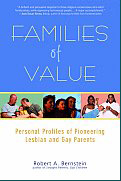Families of Value

written by Robert A. Bernstein
Marlow & Co., New York, 2005.
reviewed by Lyn Staack
In his introduction to Families of Value, Robert Bernstein comes out as the father of a lesbian. He shares that while he wasn’t particularly surprised by his daughter’s coming out as a lesbian, he was surprised by the journey her disclosure began for him.
Bernstein’s first book Straight Parents, Gay Children: Keeping Families Together was published in 2003. It was born out of his admiration for the many gay, lesbian, bisexual and transgendered people he had met through his daughter and the inspiration he received from many of their parents. Specifically, the many parents willing to publicly defend their children’s right to live openly in society.
Families of Value, his second book, is also about the need and right of gay, lesbian, bisexual and transgendered people to live openly and be respected and valued by society.
The book profiles exceptional lesbian and gay parents and makes a strong argument against those who claim that lesbians and gay men are not capable of creating loving, healthy, lasting families. He acknowledges that the families he has chosen are not typical or representative. They are specifically pioneers—outstanding examples of couples who have overcome societal prejudice and assumptions, challenged laws, and educated whole communities in their pursuit of their dreams to be parents. Their stories are inspiring and sure to challenge anyone who doubts the sincerity, dedication or love of gay or lesbian parents.
In making his defense of gay and lesbian parents, Bernstein selected families that present and address a number of issues. The stories include children adopted through state foster care, internationally, second parent adoption, artificial insemination with a friend as the donor and using sperm banks, surrogate mothers, birth mothers, families where couples have stayed together and one where the parents have separated but continue to parent together. He includes family background on all of the parents and consciously brings in issues of diversity around race, religion, class, family and community values.
Regardless of anyone’s opinion or acceptance, millions of children are already being raised by same-sex parents and those numbers are going to continue to increase. As Bernstein’s book clearly illustrates, lesbians and gay men who choose to pursue becoming parents can create amazing families and raise wonderful children in spite of the difficulties they may face. (If anything, as a lesbian parent reading this book, I had to remind myself that he has picked families that set incredibly high standards. We do not all have to be “super-parents” to be good parents.)
He also clearly illustrates the effect that the homophobia and double standards of our society have on these families and their children. Clearest perhaps in the words of the children themselves is a key duality of queer families. In chapter 5, Bernstein quotes a teenager, “I loved my moms, but I was ashamed of their relationship. It took me a long time to realize… even though I truly believed that homosexuality was just as valid and natural as heterosexuality, I was living in a society that didn’t…”
An excellent book to bolster our pride in the bravery and integrity of others in the GLBT parenting community, a good reminder of the realities of our society and the ways homophobia may effect our families and children, and a great book to give straight in-laws or relatives to encourage them to be active in their support of our families, even if only for the sake of our children.
To purchase this book, please visit:Information published on The Rainbow Babies website is not a substitute for proper medical advice, diagnosis, treatment or care. Always seek the advice of a physician or other qualified health providers with any questions you may have regarding a medical condition.
Disclaimer: The Rainbow Babies provides sample contracts and legal/social health articles for informational purposes only—please do not consider it as legally-binding advice of any kind.


